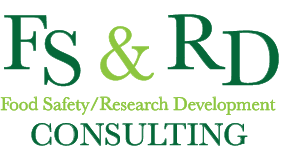GFSI (Global Food safety initiatives) - Choosing the program that's best for you.
Why is there a Global food safety initiative (GFSI)?
There are many complex challenges today in the food industry one of which is maintaining food safety in a complex and everchanging manufacturing environment. New pathogens are showing up in recalls and no matter what food safety measures are in place the number of recalls is not decreasing.
Many of the large retailers got together several years ago and put together the GFSI scheme. GFSI is committed to providing continuous improvement in food safety management systems and carries out relevant updates every four years to meet new food industry and safety challenges. Many certification bodies have embraced the GFSI regulations including SQF, BRC, FSSC, and IFS just to name a few.
How do you know which one of them is right for you?
All of them are similar as they use the GFSI as their regulatory guidance in setting up their regulations. They all have protocols for food safety and quality management, training, product and process development. They all include sanitation, maintenance and other prerequisite programs. Most of them have separate modules for facilities that provide packaging or storage and distribution to the food industry.
SQF is recognized by retailers around the world who require a rigorous, credible food safety management system. SQF will help reduce assessment inconsistencies and links primary production certification to food manufacturing, distribution and agent/broker management certification. SQF is the only scheme to integrate a quality component as well as food safety.
BRC Global Standards is a leading safety and quality certification program, used by over 23,000 certificated suppliers in 123 countries, with certification issued through a worldwide network of accredited certification bodies. It guarantees the standardization of quality, safety and operational criteria and ensure that manufacturers fulfil their legal, food safety, and food quality obligations providing protection for the end consumer.
FSSC 22000 is based on existing ISO Standards. It demonstrates your company has a robust Food Safety Management System in place that meets consumer and customer requirements. It provides guidance on food safety requirements and management. The Scheme consists of three components: ISO 22000, sector specific Prerequisite programs, and specific FSSC 22000 requirements. Besides these three components there's a voluntarily FSSC 22000 - Quality module based on all requirements of ISO 9001.
IFS Food Standard is another GFSI (Global Food Safety Initiative) recognized standard for auditing food manufacturers. The focus is on food safety and the quality of processes and products. IFS Food applies when products are “processed” or when there is a hazard for product contamination during primary packing. The Standard is important for all food manufacturers, especially for those producing private labels, as it contains many requirements related to the compliance with customer specifications.
My advice is choose the one that best fits with the programs that you already have in place. If you already have HACCP in place BRC is a good choice but if you are ISO certified than FSSC makes a lot of sense. At the end of the day, no matter which one is chosen you are well on your way to providing your consumers with assurances of food safety and quality. If you need assistance with the implementation of a GFSI program please let us, at FSRD Consulting, provide you with a free quote. You can reach us at: http://www.fsrdconsulting.com
